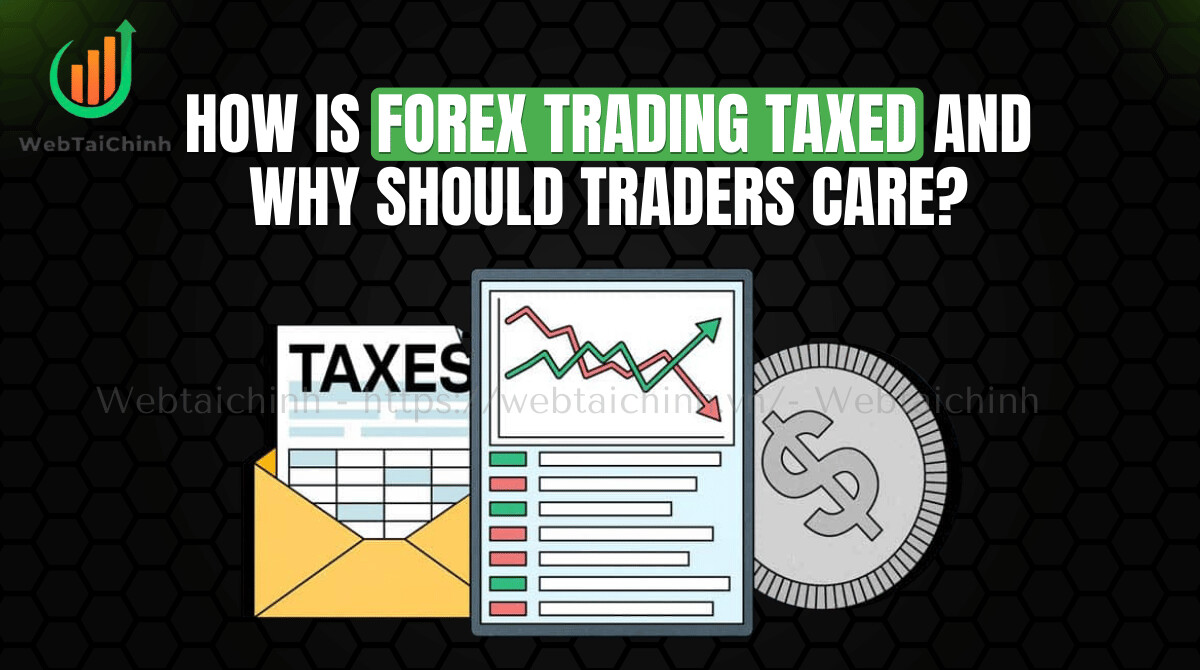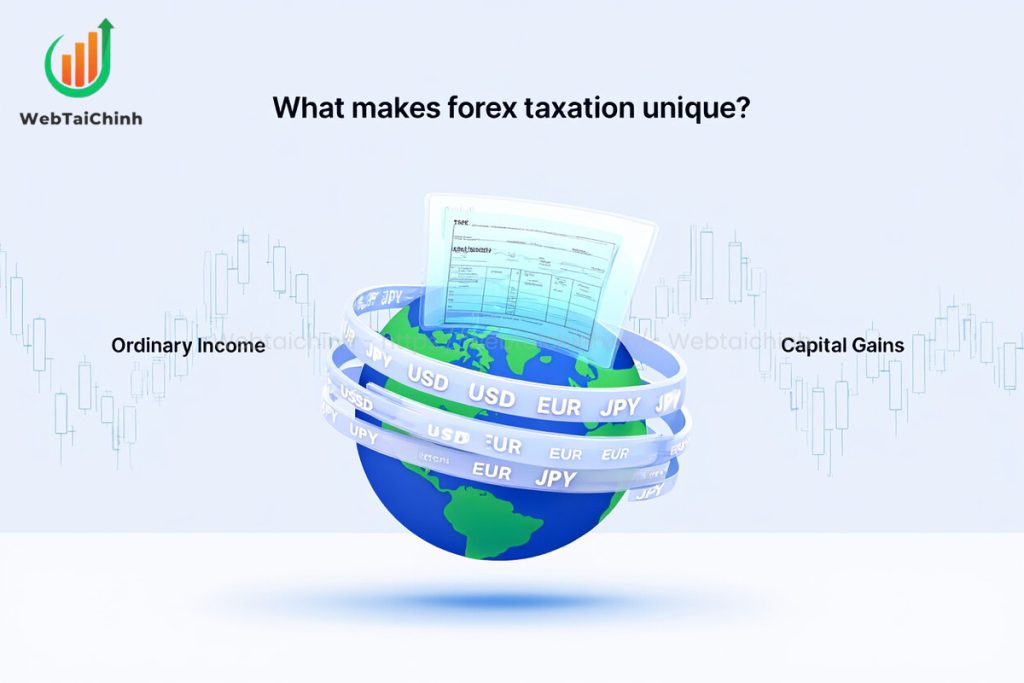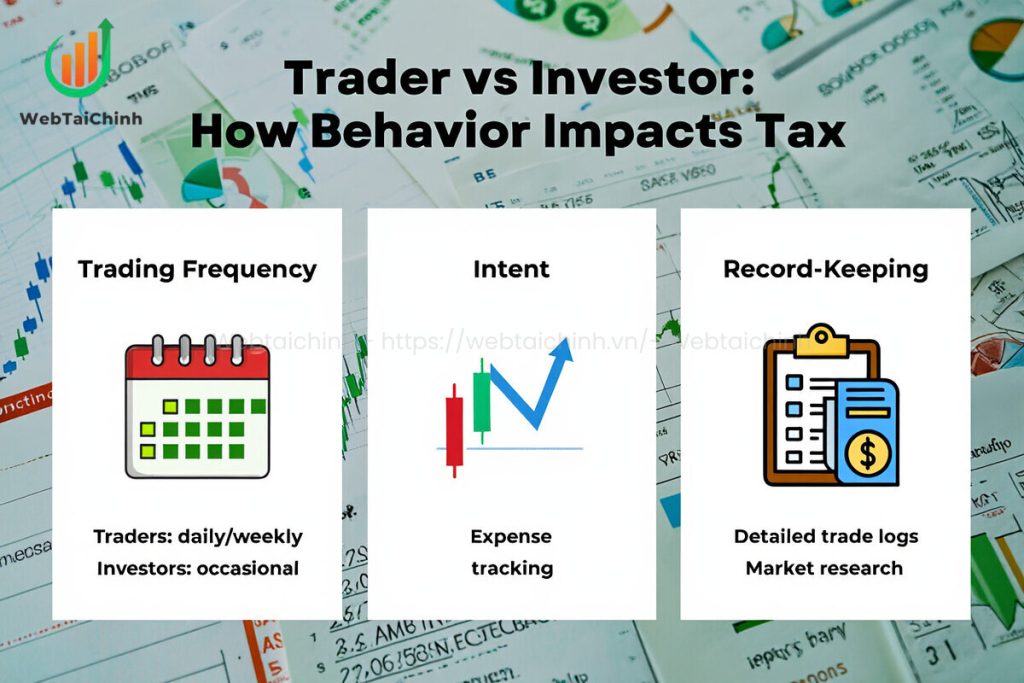Physical Address
304 North Cardinal St.
Dorchester Center, MA 02124
Physical Address
304 North Cardinal St.
Dorchester Center, MA 02124

How is forex trading taxed and why should traders care? In 2025, tax rules for forex profits have become more complex than ever, and misunderstanding them could cost you thousands in penalties. Whether you trade casually, run a full-time trading business, or invest for the long haul, the way your forex gains are taxed depends on your trading style, the instruments you use, and your country of residence.
Failing to report forex gains accurately can trigger IRS audits, unexpected tax bills, and legal consequences. Recent data shows that forex-related tax audits in the U.S. rose by over 15% between 2023 and 2024 clear evidence that tax authorities are tightening oversight. And it’s not just the U.S.; regulators worldwide are refining their rules as global trading and digital brokerage platforms expand.
In this guide, Webtaichinh will break down the latest tax codes, rates, and strategies to help you stay compliant while keeping more of your profits. We’ll cover U.S. rules like Section 988 and Section 1256, compare global tax treatments, and share practical filing tips every trader needs to know.
Key takeaways
Forex taxation is not as straightforward as stock or crypto taxes. The complexity comes from the variety of instruments, different tax codes, and how your trading behavior is classified. Understanding these basics is the foundation for accurate reporting and effective tax planning.
Forex operates in a 24/5 decentralized global market, which means trades are executed over-the-counter (OTC) or via regulated exchanges depending on the product. Unlike stock trading where most gains fall under capital gains tax forex profits can be taxed as ordinary income or as capital gains, depending on the tax code applied.

Several factors make forex taxation unique:
Multiple tax treatments: Ordinary income vs 60/40 capital gains split.
Instrument-based rules: Spot forex, futures, and options can each fall under different tax codes.
Cross-border complexity: Global traders may face dual reporting obligations.
Potential deductibility of expenses: Only certain trader classifications can claim these benefits.
A taxable event is any transaction that results in a realized gain or loss meaning the trade is closed, and the result is final. For forex, the main taxable events include:
Closed trades: Gains or losses when you exit a position.
Rollover/Swap interest: Income or expenses from holding a position overnight.
Premiums from options: Profits or losses from buying/selling forex options.
Settlements on futures contracts: Gains/losses at expiry or on offsetting trades.
Key point: You owe taxes on realized gains even if you haven’t withdrawn the funds from your broker account. Tax authorities care about when the trade is closed not when you cash out.
Your trading frequency, intent, and instrument choice determine how your gains are taxed. In the U.S., for example:
Spot forex (OTC) typically falls under Section 988 – Ordinary Income.
Exchange-traded futures and options often fall under Section 1256 – 60/40 Capital Gains.
Besides tax classification, legal eligibility like how old do you have to be to trade forex also varies by country.
In other countries, classification can determine whether you pay capital gains tax or income tax and whether you qualify for deductions. We’ll explore these specifics in detail in the next sections.
For traders asking how is forex trading taxed in the United States, the answer depends primarily on the type of forex instrument you trade. The IRS applies two main tax regimes Section 988 and Section 1256 each with its own rules, rates, and strategic implications.

Section 988 governs most spot forex and other over-the-counter (OTC) currency contracts. Under this provision:
Gains are taxed as ordinary income, at your federal marginal tax rate (10%–37%).
Losses can offset ordinary income from other sources, which can be advantageous for traders with losing years.
Example:
If you make $5,000 from spot forex in 2025 and fall into the 24% tax bracket, your tax due is:
$5,000 × 24% = $1,200.
Pros: Losses fully deductible against other income.
Cons: No access to lower long-term capital gains rates.
Note: Traders can elect out of Section 988 in certain cases, opting for capital gains treatment under Section 1256 but the election must be made before the tax year begins and follow IRS rules.
Section 1256 applies to regulated futures contracts and options on futures, including certain currency pairs. The rule offers a blended tax rate:
60% of gains taxed at long-term capital gains rates (0%–20%).
40% taxed at short-term capital gains rates (ordinary income rates).
Example:
If you earn $10,000 from forex futures:
60% × $10,000 = $6,000 @ 15% = $900 tax.
40% × $10,000 = $4,000 @ 24% = $960 tax.
Total = $1,860.
Pros: Lower effective tax rate compared to Section 988.
Cons: Losses under Section 1256 can only offset gains from similar contracts.
Understanding how is forex trading taxed means evaluating which section benefits you most:
If you expect consistent gains → Section 1256 may lower your tax rate.
If you anticipate potential losses → Section 988 allows broader offsets.
Regardless of which section applies, accurate reporting is critical:
Form 8949: Capital gains and losses.
Form 6781: For Section 1256 contracts.
Schedule D: Summary of gains/losses.
Schedule C: If you qualify as a trader in business.
Failing to classify trades correctly is one of the most common and costly mistakes forex traders make.
When exploring how is forex trading taxed, it’s not just the instrument type that matters the IRS also looks at how you trade. Your classification as a trader, investor, or hobbyist can significantly change your tax obligations, deductions, and reporting requirements.

The IRS uses several factors to determine your status:
Trading frequency: Traders execute transactions regularly and substantially, often daily or weekly.
Intent: Traders aim to generate income from short-term market movements; investors focus on long-term capital appreciation.
Record-keeping: Detailed logs of trades, expenses, and market research support trader status.
Summary table:
| Criteria | Trader status | Investor status | Hobbyist status |
|---|---|---|---|
| Trading frequency | High, regular, substantial | Occasional | Infrequent |
| Intent | Income from trading | Long-term growth | Personal enjoyment |
| Deductions | Full business expense deduction | Limited investment expenses | Generally none |
| Audit risk | Higher | Moderate | Low |
If you qualify as a trader in business, you can:
Deduct business expenses such as home office, trading software, internet costs, and market subscriptions.
Elect mark-to-market accounting under Section 475(f), allowing you to treat all gains/losses as ordinary income and avoid wash sale rules.
Offset losses more flexibly against other income sources.
Higher audit risk: The IRS closely reviews trader status claims due to potential misuse.
More complex reporting: Requires Schedule C for expenses and possibly Form 4797 for mark-to-market gains/losses.
Understanding your classification is crucial to knowing how is forex trading taxed in your specific case. Misclassifying yourself can lead to:
Overpaying taxes by missing deductions.
Underpaying taxes and triggering penalties.
Increased audit risk due to inconsistent reporting.
Tip: If you trade full-time or generate most of your income from forex, consider consulting a tax professional to determine if trader status is worth pursuing.
For traders outside the U.S., how is forex trading taxed depends entirely on the local tax system. While many countries follow similar principles taxing either as capital gains or as income the rates, exemptions, and filing requirements can differ dramatically.

In the UK, forex taxation hinges on your trading style and whether you use spread betting:
Capital gains tax (CGT): Applies to casual or investor-type forex trading.
Income tax: Applies if trading is frequent and business-like.
Spread betting: Tax-free for eligible individuals, but losses are not deductible.
Example:
If you make £12,000 in forex capital gains and the CGT annual exempt amount is £6,000, only £6,000 is taxable at 10% or 20% depending on your income level.
Filing: Report CGT on the SA108 Capital Gains Summary annually.
The EU has no unified forex tax policy each member state sets its own rules:
| Country | Tax type | Rate range |
|---|---|---|
| Germany | Capital gains/income | 25%–45% |
| France | Capital gains/income | 12.8%–30% |
| Netherlands | Wealth tax + income | 30%–49.5% |
| Spain | Capital gains | 19%–26% |
Many EU countries treat forex as capital gains unless trading is deemed a business. Some also impose wealth taxes based on total assets at year-end.
Canada’s treatment depends on whether you are classified as an investor or running a trading business:
Capital gains tax: Only 50% of the gain is taxable at your marginal rate.
Business income: 100% of profits are taxable but allow full deduction of expenses.
Note: Frequent trading may lead the CRA (Canada Revenue Agency) to classify you as a business.
Similar to Canada, forex profits are:
Capital gains: For occasional investors, with a potential 50% discount if the asset is held for over 12 months.
Ordinary income: For traders running forex as a business.
Singapore is one of the most tax-friendly jurisdictions for forex traders:
No capital gains tax: Most forex trading profits are untaxed.
If trading is classified as a business, profits may be subject to income tax.
If you are trading across borders or plan to start a forex brokerage firm, understanding how is forex trading taxed in each jurisdiction you operate in is essential. Tax residency rules, double taxation treaties, and reporting thresholds can dramatically affect your net returns.
Pro tip: Keep separate records for each country where you trade and consult local tax professionals to ensure compliance.
When learning how is forex trading taxed, it’s not enough to understand the rules you also need to apply smart strategies that minimize liability and avoid costly mistakes.
The IRS and other tax authorities expect traders to maintain detailed records:
Trade logs with entry/exit dates, position sizes, and profit/loss amounts.
Brokerage statements and transaction confirmations.
Expense receipts for trading-related costs (software, internet, education).
Why it matters: If you’re ever audited, accurate documentation can prove your reported numbers and protect you from penalties.
Misclassifying trades: Mixing spot forex (Section 988) with futures/options (Section 1256) in your reporting.
Not claiming eligible deductions: Missing out on home office, subscriptions, or platform costs.
Ignoring rollover/interest income: Overnight swap charges or credits can be taxable.
Mixing personal and business accounts: Creates confusion and weakens deduction claims.
Neglecting international reporting: For U.S. traders, failing to file FBAR or FATCA for foreign accounts can lead to heavy fines.
Section 988 opt-out: If you expect gains, elect capital gains treatment under Section 1256 to take advantage of lower effective rates.
Loss harvesting: Close losing trades before year-end to offset gains.
Entity formation: Consider forming an LLC or S-corp for better deduction management and potential tax benefits.
Tax-advantaged accounts: In the U.S., use IRAs; in the UK, use ISAs to shield gains.
Cross-border planning: Utilize double taxation treaties to avoid paying tax twice.
If you’ve discovered errors in past filings, act quickly:
U.S. traders: File an amended return with Form 1040X.
UK traders: Use HMRC’s self-assessment amendment process.
Other countries: Contact your tax authority directly.
The sooner you correct errors, the lower the risk of penalties and interest charges.
Proactive planning transforms how is forex trading taxed from a compliance headache into a strategic advantage. By choosing the right tax code, keeping organized records, and timing trades strategically, you can keep more of your profits and reduce the likelihood of audits.
For traders wondering how is forex trading taxed and how to stay on the right side of the law, here’s a quick action plan you can follow every tax year.
Identify your instrument type: Spot forex (Section 988) vs futures/options (Section 1256).
Select your tax treatment: Decide on Section 988 default or opt for Section 1256 before the tax year starts.
Track all trades: Keep daily logs and reconcile with brokerage statements.
Prepare the right forms:
Form 8949 – Capital gains/losses.
Form 6781 – Section 1256 gains/losses.
Schedule D – Summary of capital gains.
Schedule C – If qualifying as a trader in business.
Meet deadlines: Typically April 15 (extensions possible).
Determine your tax type: CGT for investors, income tax for business-like trading, or tax-free spread betting if eligible.
Claim allowances: Use the CGT annual exemption.
File with HMRC: Complete SA108 Capital Gains Summary if required.
Check your country’s rules: Each EU country has unique rates and exemptions.
Watch for wealth tax: Applies in some countries like the Netherlands.
Canada: 50% taxable for capital gains, 100% for business income.
Australia: CGT discount possible for assets held >12 months.
Singapore: No capital gains tax unless classified as business income.
Separate trading and personal accounts to simplify reporting.
Document every expense for maximum deductions.
Consult a tax professional in your jurisdiction especially for cross-border trading.
Stay updated: Tax laws change; review your strategy annually.
Final note: Treat taxes as part of your trading plan, not an afterthought. A single missed deadline or misclassification can wipe out months of profits.
Start your next learning step here:
Yes. Tax applies when you realize a gain (close a trade), regardless of whether the funds remain in your broker account.
Yes. Jurisdictions like Singapore, UAE, Hong Kong, and some offshore centers may not tax forex gains, depending on residency and local laws.
Yes. In the U.S., using a self-directed IRA can defer taxes until withdrawal, offering significant long-term savings.
By leveraging double taxation treaties between countries and correctly declaring tax residency, traders can reduce or eliminate duplicate tax payments.
Elect the most favorable tax treatment available in your jurisdiction, keep meticulous records, and consider loss harvesting or entity formation where beneficial.
How is forex trading taxed ultimately depends on where you live, what instruments you trade, and how your trading activity is classified. Whether you’re a casual investor or a full-time trader, knowing the relevant tax rules is essential to keeping your profits and avoiding compliance issues.
In this guide, we’ve covered how forex is taxed in the U.S. under Section 988 and Section 1256, explored tax regimes in major jurisdictions like the UK, EU, Canada, Australia, and Singapore, and shared practical strategies to minimize liability. By applying these insights, you can turn tax compliance from a stressful task into part of your trading edge.
Checklist recap:
How do you plan to adjust your trading or tax strategy in the coming year? Share your thoughts or questions so we can help you and other traders navigate these rules effectively.
Web Tai Chinh is a portal that updates news and information related to finance quickly and accurately, helping users have an overview before investing, clearly understanding concepts and terms related to Finance. Explore more insights in our Forex category, start your FX trading journey today with the right partner for long-term success.
📞 Contact: 055 937 9204
✉️ Email: webtaichinhvnvn@gmail.com
📍 Address: 13 Ho Tung Mau, An Binh, Di An, Binh Duong